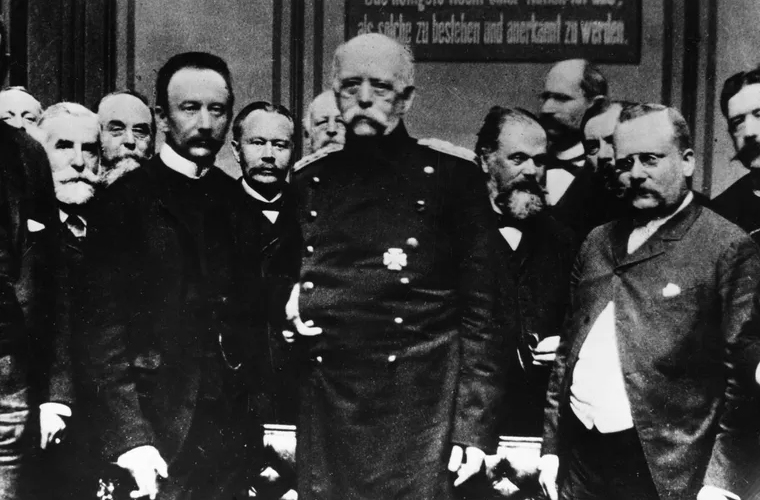Otto von Bismarck (April 1, 1818–July 30, 1898), a son of the Prussian aristocracy, unified Germany in the 1870s. And he actually dominated European affairs for decades through his brilliant and ruthless implementation of realpolitik, a system of politics based on practical, and not necessarily moral, considerations.
Early Years
Bismarck started out as an unlikely candidate for political greatness. Born April 1, 1815, he was a rebellious child who managed to attend university and become a lawyer by the age of 21. But as a young man, he was hardly a success and was known for being a heavy drinker with no real direction in life.
In his early 30s, he went through a transformation in which he changed from being a fairly vocal atheist to being quite religious. He also married, and became involved in politics, becoming a substitute member of the Prussian parliament.
In a meeting with legislators in late September 1862, Bismarck made a statement that would become notorious: “The great questions of the day will not be decided by speeches and resolutions of majorities…but by blood and iron.”
Austro-Prussian War
In 1864 Bismarck, utilizing some brilliant diplomatic maneuvers, engineered a scenario in which Prussia provoked a war with Denmark and enlisted the help of Austria, which derived little benefit itself. This soon led to the Austro-Prussian War, which Prussia won while offering Austria fairly lenient surrender terms.
The ‘Ems Telegram’
A dispute arose in 1870 when the vacant throne of Spain was offered to a German prince. The French were concerned about a possible Spanish and German alliance, and a French minister approached Wilhelm, the Prussian king, who was in the resort town of Ems.
Franco-Prussian War
The war went disastrously for France. Within six weeks, Napoleon III was taken prisoner when his army was forced to surrender at Sedan. Alsace-Lorraine was overtaken by Prussia. Paris declared itself a republic, and the Prussians besieged the city. The French eventually surrendered on January 28, 1871.
Chancellor of the Reich
From 1871 to 1890 Bismarck essentially ruled a unified Germany, modernizing its government as it transformed into an industrialized society. Bismarck was bitterly opposed to the power of the Catholic Church, and his kulturkampf campaign against the church was controversial but ultimately not entirely successful.
Fall From Power and Death
Kaiser Wilhelm died in early 1888, but Bismarck stayed on as chancellor when the emperor’s son, Wilhelm II, ascended to the throne. But the 29-year-old emperor was not happy with the 73-year-old Bismarck.
The young Kaiser Wilhelm II was able to maneuver Bismarck into a situation in which it was publicly stated that Bismarck was retiring for reasons of health. Bismarck made no secret of his bitterness. He lived in retirement, writing and commenting on international affairs, and died in 1898.
Legacy
The judgment of history on Bismarck is mixed. While he unified Germany and helped it become a modern power, he did not create political institutions that could live on without his personal guidance. It has been noted that Kaiser Wilhelm II, through inexperience or arrogance, essentially undid much of what Bismarck accomplished, and thereby set the stage for World War I.

